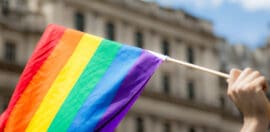The case for real diversity and inclusion

15 July 2021 at 8:00 am
To launch a new monthly column focusing on Australia’s LGBTIQA+ community, Nevena Spirovska looks at how your organisation can be sure it’s creating a positive experience for LGBTIQA+ people.
The everyday experience of navigating services can be overwhelming at best. Despite good intentions, service providers can unknowingly perpetuate discriminatory practices and mistreatment with legacy software systems, budget pressures that don’t allow for organisation-wide best-practice training, and dated internal policy suites that aren’t consistently reviewed. Progress can be slow, but the case for change is a strong one if our organisations are to be truly diverse and inclusive.
Processes that should be relatively simple, such as updating a name or gender identity, can be a challenge that takes a considerable amount of effort (or even multiple efforts), especially if having to be done across numerous organisations. Most service users will understand the difficulty of bureaucratic processes, but this can be compounded for LGBTIQA+ (lesbian, gay, bisexual, trans and gender diverse, intersex, queer, and asexual) people.
Though inadvertent, the outcomes can be the experience of direct and indirect discrimination of LGBTIQA+ people. This can lead to services being under-utilised and delays in people seeking treatment or support due to actual and anticipated experiences of stigma and discrimination from service providers. LGBTIQA+ people may also choose to hide their sexuality, intersex status, or gender identity when accessing services, which can contribute to less holistic support being offered. How inclusive are our organisations when a person chooses to exclude such an important part of their identity?
There is increasing recognition by health and community service providers and policy-makers in Australia that LGBTIQA+ communities have unique health and wellbeing needs, and that addressing these should be a priority. Even today, there are significant disparities in health and wellbeing for LGBTIQA+ communities, compared to the general population. Consideration should also be given to Aboriginal and Torres Strait Islander LGBTIQA+ people who can experience prejudice based on their race and LGBTIQ+ status. Research and lived experience attributes this to inequality and the devaluing of identities and relationships as well as systemic and organisational failures to recognise and protect bodily autonomy. LGBTIQA+ people also report high levels of harassment, verbal and physical abuse, violence and sexual assault. This occurs in public and in all areas of their lives. The sector must be a positive touchpoint for all LGBTIQA+ people by providing affirming, inclusive, and high-quality services to the community.
But how can your organisation be sure that it is creating a positive experience for LGBTIQA+ people?
If you don’t already have a “diversity and inclusion role” or pride group established, take this opportunity to assess just how responsive you are to the needs of LGBTIQA+ people. As a service provider, can a trans and gender diverse person easily update their gender identity, choose a non-binary option, and list a non-gendered title in your CMS? Are your staff trained on LGBTIQA+ inclusivity and is this underpinned by internal policies and support when needed? Is the diversity of LGBTIQA+ understood, embraced, and celebrated through days of significance such as Transgender Day of Remembrance and the International Day Against Homophobia, Biphobia, Intersexism and Transphobia? Does your organisation’s website, annual report, marketing material, social media content, and graphic design predominately depict heteronormative people, relationships, and families? If so, this is the opportunity to assess, review, resource, and update.
Language can be just as important. Often, LGBTIQA+ people are framed as “vulnerable”, however, when we talk of vulnerability, it is important to remember that it is not a person’s sexual orientation, gender identity, or intersex status that is the reason for their disadvantage, but rather the failure of organisations to ensure that everyone has equal access to services and equal rights when dealing with service providers.
While the vast majority of the sector recognises the importance of offering safe and affirming services to LGBTIQA+ people, and also highly regard the values of equality, diversity and inclusivity, these need to be practices beyond platitudes. To become more than a rainbow sticker on the entrance door, values must be put in action, with change being properly resourced and prioritised, and budget allocated to supporting staff to understand the unique challenges and needs of LGBTIQA+ people.
Arthur Chan summarised it perfectly when he said that diversity is a fact. Equity is a choice. Inclusion is an action. Belonging is an outcome and an outcome that we can all achieve through positive action.








